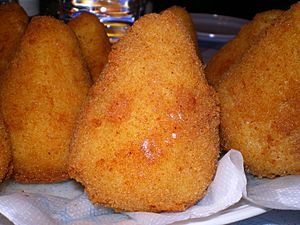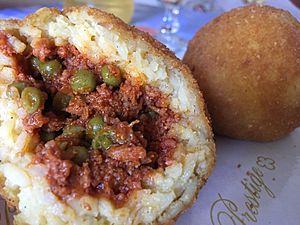Arancini facts for kids

Sicilian arancini for sale at a counter
|
|
| Type | Snack, street food |
|---|---|
| Place of origin | Italy |
| Region or state | Sicily |
| Serving temperature | Hot or warm |
| Main ingredients | rice, ragù |
Arancini are yummy Italian rice balls. They are filled with tasty ingredients, covered in bread crumbs, and then deep fried. These golden balls are a very important part of Sicilian cuisine, which is the food style from the island of Sicily in Italy.
The most popular fillings are:
- Al ragù: This one has a rich meat sauce (called ragù), mozzarella or other cheese, and often peas.
- Al burro: This one is filled with ham and mozzarella cheese, or a creamy white sauce called béchamel.
You might find different shapes of arancini. For example, those made in eastern Sicily often look like a cone. This shape is inspired by the famous volcano, Etna, which is also cone-shaped!
What Does "Arancini" Mean?
The word Arancini comes from the Italian word arancia, which means 'orange'. So, arancini means "little oranges."
They got this name because of their shape and color. After they are cooked, arancini look a lot like small, round, golden oranges. The singular word for one arancino is arancino.
The History of Arancini
Arancini are believed to have started in Sicily way back in the 10th century. At that time, the island was under Arab rule.
In cities like Palermo, Siracusa, and Trapani in Sicily, arancini are a special traditional food. People eat them on December 13th for the feast of Santa Lucia. On this day, people usually do not eat bread or pasta. This tradition remembers a time in 1646 when a ship full of grain arrived on Santa Lucia's day. It helped end a very bad hunger crisis.
Today, arancini are super popular! You can find them all year round in most food shops in Sicily. They are especially common in Palermo, Messina, and Catania. Long ago, this dish was made to give a full meal to Federico II di Svevia when he went hunting.
Different Kinds of Arancini

The most common arancini you'll find in Sicilian cafes are arancini al ragù. These usually have meat in a tomato sauce, rice, and mozzarella or another type of cheese.
Many cafes also sell arancini al burro. These are made with butter or béchamel sauce. You can also find special arancini with other fillings, such as:
- Con funghi: with mushrooms
- Con pistacchi: with pistachios
- Con melanzane: with aubergine (eggplant)
Other places in Italy have similar rice balls. In Roman cuisine, there are supplì. These are also rice balls but are usually filled with cheese. In Naples, rice balls are called pall'e riso.
See also
 In Spanish: Arancini para niños
In Spanish: Arancini para niños
 | Calvin Brent |
 | Walter T. Bailey |
 | Martha Cassell Thompson |
 | Alberta Jeannette Cassell |


